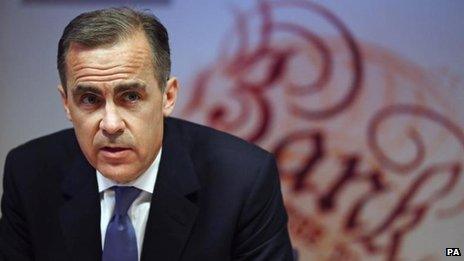Mark Carney’s almost promise on rates
- Published
- comments

For most people, the most important thing the governor of the Bank of England said today is that the interest rate the bank controls, the Bank Rate, will not be raised for some time and could still be as low as 2% in 2017.
For Bank watchers, perhaps more important is how he has ditched the simple revolutionary system of so-called forward guidance on the future path of rates, introduced only last summer, for a more complex and fuzzier approach (and see the note I wrote last night for more on this).
The Bank's Monetary Policy Committee had in August said a rise in interest rates would not be contemplated till the unemployment rate was 7%.
But with that threshold set to be breached within weeks, years earlier than the Bank had originally expected, the governor is now saying that rates won't be raised till the slack or spare capacity in the economy is on its way to being eliminated.
Mark Carney wants this to be seen as a bold statement that the Bank remains committed to supporting further falls in unemployment and long-delayed improvements in living standards.
Many will see it as almost a political statement, a statement to a hard-up nation that the Bank is on its side.
But it is slightly less clear what it means in respect of monetary policy and economics.
The Bank has published an estimate that the economy currently has spare capacity equivalent to up to 1.5% of GDP or national output.
It says at least half this gap is due to people being unemployed or under-employed, and that it does not expect the gap to be closed for more than two years.
Which supports Carney's almost-promise that money will remain very cheap, that interest rates will remain at historic lows for years.
But he also categorically refuses to give any kind of binding commitment to keep rates low for a specific period.
And he concedes that the Bank's estimate of the output gap and the rate at which it will close are bound to be wrong.
Or to put it another way, the big change between Carney's Bank of England and that of his immediate predecessors is that they refused to talk about what they thought the future path of interest rates would be, whereas he relishes making non-binding, very general statements that interest rates should remain low - unless the Bank of England's view on spare capacity turns out to be wrong.
That feels like a cultural difference. And maybe it is economically significant, if somehow businesses and households take confidence from it and therefore invest and spend more.
But here is the thing.
The Bank of England priority remains the same as it ever was, to keep inflation at more or less 2% over the forecasting time horizon (albeit that since 2009, and till recently, this was a target consistently overshot).
Now the moment the Monetary Policy Committee were to decide that inflation was rising above 2% in a sustained and pernicious way, interest rates would rise.
And that judgement would be made in more-or-less the same way today as it would have been under Carney's predecessors, King and George - namely on an assessment of whether the economy was growing above capacity, bringing the risk of self-reinforcing rises in wages and other costs determined by domestic demand.
So Carney's focus on spare capacity is not such a break with the past.
And in that sense, it does not seem unreasonable to argue that forward guidance, in the form it was sold just a few months ago, is in the dustbin of monetary history.